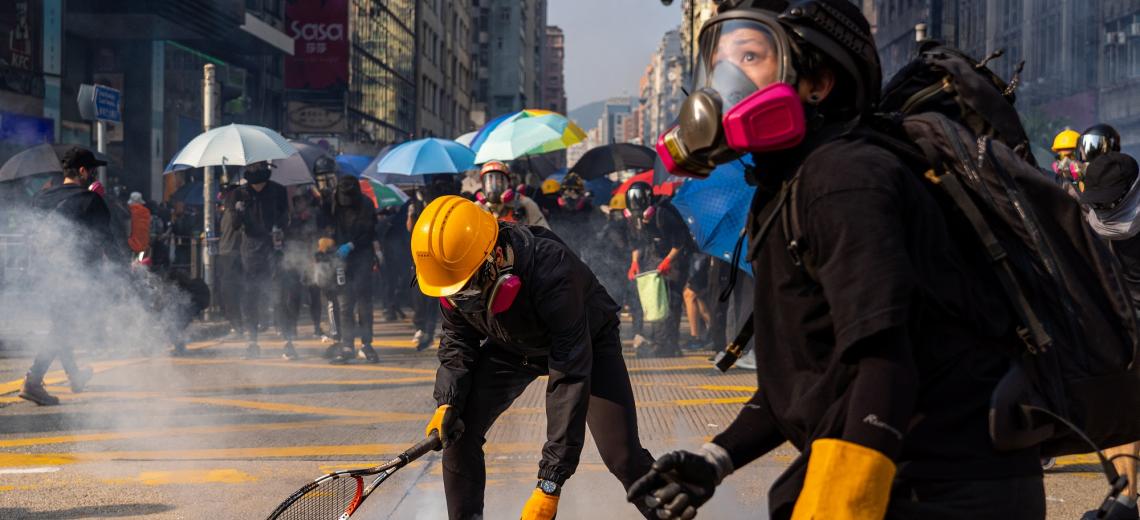
6 minute read
ANU Research School of Management’s Dr Di Fan shares his thoughts about the ongoing unrest in Hong Kong and the impact it could have on Australian and international trade.
It is easy at a time like this to forget that other crises around the world have not gone away. The violence and social unrest in Hong Kong continue, despite the rest of the world turning its attention to COVID-19.
Background
These protests began in 2019 as a response to an extradition bill introduced by the Hong Kong Special Administrative Region (HKSAR) Government and have been roiling for almost a year. The bill has since been withdrawn, but the underlying issues it brought to the surface have not gone away.
The initial concerns about the bill highlighted the potential for Hong Kong citizens to be extradited to Mainland China for trial, and therefore becoming subject to a different system of law. As the turmoil unfolded, Hong Kong society was split into two groups: The pro-police camp, who have closer ties to Mainland China and are pro-establishment; and the pro-protestor or pro-pan-democracy camp, who are broadly in favour of increasing democracy and liberal values. Each side has accused the other of inciting violence and contributing to an erosion of Hong Kong society.
Economic instability
Although this social movement is the result of multiple factors, economic issues lie at its roots. In the last two decades, Hong Kong has benefitted hugely from the tourism industry, since Mainland China allowed its citizens to visit Hong Kong on an individual basis. However, most of these economic benefits have been seized by the upper-middle and upper classes.
In the last 20 years, the average salary of recent university graduates has only increased by about A$1,000, yet inflation has hit other parts of the market, making Hong Kong’s real estate some of the least affordable in the world. Property prices have increased by 80% since 1997 and the median house price is 19.4 times the median family income. The Gini coefficient, which is a measure of economic distribution, is 0.539 (2016) in Hong Kong, which is above the alertness line for a wealth gap (0.4) and indicates the risk of social instability.
Trade impact
The protests, coupled with the economic volatility and COVID-19 outbreak, have had big implications for domestic and international trade. In December of 2019, Hong Kong visitor numbers had dropped by 50% and retail sales were down by 21%. By February this year, visitors were down by 96%. Now with COVID-19 freezing the market further, Hong Kong’s recession is all but guaranteed.
Australia exports a lot of agricultural products to Hong Kong, such as wine, beef and pork, so this economic and social instability will undermine domestic consumer confidence and spending on these items will decrease. However, the recent COVID-19 outbreak has kept Hong Kong citizens at home, which may increase the local demand to consume these products. Australian firms may also turn their focus supplying wholesale for restaurants, to supplying retail trade for supermarkets.
Internationally, Hong Kong is an important re-export centre, connecting Mainland China and the Western markets. As US firms pull out of Hong Kong because of the ongoing trade war between the US and China, it is an opportunity for Australian firms to fill this gap. Similarly, Hong Kong universities were very popular amongst Mainland Chinese students because of their high rankings and geographical and cultural proximity to China. However, the riots have forced potential students to rethink their preferences out of safety.
The COVID-19 crisis introduces a lot of new factors to the situation in Hong Kong, and compounds an already volatile situation. However, although the country’s GDP has been dropping, it has recovered well from other major shocks in the past through strong economic and legal foundations. Australia may play a large role in helping to meet the changing demands and needs of the Hong Kong market.
The College is always keen to explore research collaborations with the public and private sector and to reconnect with alumni. Please get in touch if you would like to know more about partnering with us.
